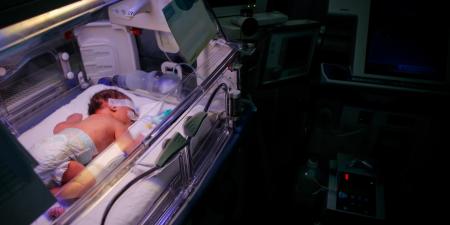This issue of Virtual Mentor explores the complex decisions that advances in neonatal intensive care have forced physicians, parents, and society to confront. The neonatal intensive care unit is widely celebrated as one of the great triumphs of the medical community in the past 30 years. Not only are NICUs credited with highly publicized cases of "miracle babies" born at the extremes of prematurity who go on to become highly successful members of society, they have also emerged as major profit-generating centers for financially challenged hospitals.
The threshold of viability—the age at which neonatologists will consider resuscitating premature infants—has dipped to 23 weeks' gestation in some centers. This increasingly early threshold for intervention, commonly viewed by the public as a medical triumph, has in turn decreased the gestational age at which obstetricians will perform invasive procedures for fetal well-being, often with major long-term morbidity for the mother. Although the overall survival of these extremely premature infants has increased with the development of sophisticated technological interventions, so too has our understanding of the serious short- and long-term sequelae of prematurity. The short-term morbidities associated with prematurity are described in this issue's clinical pearl by Tara Randis. Costs associated with intensive care as well as ongoing chronic care for long-term sequelae of prematurity are immense. Moreover, the ability of current treatments to bring extremely preterm infants to childhood both physically and neurologically intact remains tenuous. A large Norwegian cohort studied for 16 years showed increased medical and social disabilities in adults born at decreasing gestational ages, findings that compel us to question the true social cost of resuscitating increasingly premature infants [1].
Challenges for Physicians and Parents
Three clinical cases illustrate ethical challenges that confront NICU physicians. The first case, in which an infant with a possible diagnosis of trisomy 21 is born at 23 weeks' gestation, examines the limits of parental autonomy in determining whether to resuscitate the extremely preterm infant. Eric Eichenwald, Frank A. Chervenak, and Laurence B. McCullough summarize the clinical facts and physicians' ethical obligations that are critical in resolving disagreements between parents and physicians over resuscitation.
A NICU team struggles to make difficult treatment decisions in the absence of parent advocates in the second case, raising the question of whether it is possible to develop a rule-based approach to administration of neonatal care. Steve Leuthner and J.M. Lorenz argue that widely accepted, evidence-based guidelines for resuscitation have been forged, but no rules or guidelines can cover every possible case, and, when the limits of those guidelines are reached, physicians must determine the best interest of the infant at hand.
Balancing the interests of mother and fetus is a constant struggle for obstetricians who encounter women with medical conditions that necessitate delivery at the threshold of viability. The third case explores an obstetrician's dilemma in counseling a woman about a delivery mode that may subject the unborn fetus to significant morbidity and mortality. The reverse of this is also true. Anne Drapkin Lyerly describes the pitfalls in using nondirective counseling with patients concerning the mode of delivery for periviable fetuses. Lyerly makes a persuasive case for framing medical options in a way that offers parents socially and ethically sound choices.
Questions for Society
NICU successes and their place of prominence in U.S. hospitals entreat us to think about our shared social values. What does society's drive to exert effort and resources into resuscitating increasingly premature infants say about us? Does the fact that the Medicaid reimbursements for NICU care are among the program's highest reinforce the idea that we value supporting our most vulnerable members? Or, does it suggest an inability to regulate our own technological advances and an unwillingness to apply them in a more socially prudent manner?
In "Resuscitating the Extremely Low-Birth-Weight Infant: Humanitarianism or Hubris?" Patrick Jones and Brian Carter explain some of the social pressures for resuscitating extremely low-birth-weight infants. And Annie Janvier, in "Jumping to Premature Conclusions," describes how the goals of fertility specialists can conflict with those of neonatologists.
In their health policy commentary, "The Cost of Saving the Tiniest Lives: NICUs versus Prevention," Jonathan Muraskas and Kayhan Parsi detail the resources currently devoted to neonatal intensive care that may be better spent in prenatal care and prevention of preterm birth. Ferdinand Yates' op-ed piece exhorts physicians and parents to work together to decide on treatment for marginally viable premature infants that is in the infant's best interest.
Medical students' and residents' preparation to counsel women giving birth at the threshold of viability is a topic of urgent concern. Katherine Singh and Patrick Catalano describe the challenge of developing and teaching sound ethical judgment in the context of a rigorous obstetrical training program at a county hospital. In her personal narrative, Judette Louis offers her perspective on how delivering her own twins at 25 weeks' gestation altered the way she counsels high-risk patients facing a preterm birth.
Through these commentaries, Virtual Mentor readers are invited to explore their own attitudes toward prematurity. Those pursuing careers in pediatrics, neonatology, and obstetrics/gynecology will grapple daily with decisions about a patient's best interest—from pregnant women to prematurely born infants to concerned NICU parents. Please allow the commentaries and articles that follow to deepen your appreciation for the powerful therapeutic capacity of the NICU even as you develop a sense of our responsibility as physicians to implement this resource in a morally and socially responsible manner.
References
- Moster D, Lie RT, Markestad T. Long-term medical and social consequences of preterm birth. N Engl J Med. 2008;359(3):262-273.



